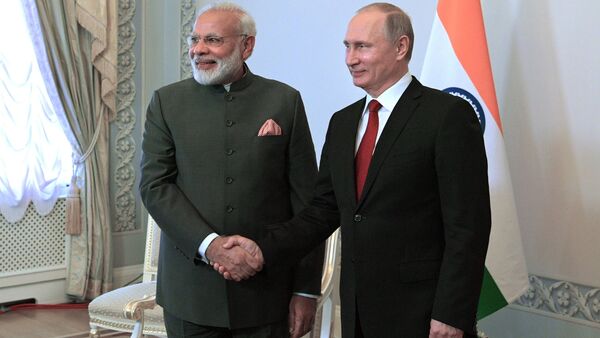Certain “rank provocateurs” in India are trying to push New Delhi into a “dangerous” and “uncomfortable” situation in its bilateral ties with Moscow, Professor Rajan Kumar, a Russian studies academic at Jawaharlal Nehru University (JNU) in New Delhi has warned.
“As India ramps up its ties with the US because of the ongoing security threat posed by China, it becomes ever more pressing for the Narendra Modi government to strike a strategic balance. India understands the value of its historic and stable relationship with Russia which is based on convergence of geopolitical interests and mutual strategic concerns,” says Kumar, an Associate Professor at JNU’s Centre for Russian and Central Asian Studies.
He further emphasised that New Delhi’s defence ties with the US have more to do with “maritime security” and the issue of free-navigation in the Indo-Pacific. “The expansionist policy of China has pushed India closer to the US,” Kumar states.
“On the other hand, India’s goodwill in Central Asia and broader Eurasian region is closely associated with its ties to Moscow. India needs Russian support to further its geopolitical interests in the Eurasian region,” he insists, adding that the key to good relations with Tehran also depends on Moscow.
Kumar comments come in response to several lawmakers in India expressing doubts over the viability of India-Russia relations, against the backdrop of the third US-India 2+2 Dialogue last month whereby New Delhi and Washington sealed a satellite--data agreement on sharing military information.
Subramanian Swamy, a senior lawmaker from India’s ruling Bharatiya Janata Party (BJP), wrote an article entitled "Russia is not a friend of India" in an English weekly on 31 October. Swamy's column triggered a rebuttal from the Russian Embassy in New Delhi, which remarked that the countries were like "soulmates".
Swamy, a former professor at Harvard University, alleged that Moscow had only been a friend of the Nehru-Gandhi family over the past few decades. Besides Moscow, Swamy’s barb was apparently directed at Congress President Sonia Gandhi and her son Rahul Gandhi, an important opposition figure.
According to Kumar, Swamy’s article demonstrates a "clear prejudice" against the Nehru-Gandhi family and India’s strong ties with Russia.
“Swamy misses the substance of India’s relation with the Soviet Union and later Russia," he reckons.
The academic expressed confidence that the Modi government attaches "high priority" to its relations with Russia, which he labelled as “comprehensive in nature, and not just based on historical legacy or the whims and fancies of one family”.
"The first overseas visit by the Indian Defence Minister during the COVID-19 crisis was to Moscow to attend the parade, and later for the multilateral defence ministers’ meeting. Modi even has excellent personal relations with President Putin,” argued Kumar.
He went on to highlight Moscow’s efforts to support the Indian economy during the Cold War period.
“Russia’s contribution to Indian nation-building has been immense. The former Union of Soviet Socialist Republics (USSR) has played a major part in India’s industrialisation process as well as the five-year-plans,” notes Kumar.
“And who could forget how the USSR supported India during the 1971 Bangladesh War of Liberation,” Kumar adds.
Task Force 74, part of America's Seventh Fleet, had been sent by President Richard Nixon's administration to the Bay of Bengal but had been forced to turn back before entering when Moscow sent nuclear submarines to support India. The US and the United Kingdom were weighing in on Pakistan's side during the conflict, according to cables which are now allowed to be seen and have been reported in several media since.
India’s decision to sign the Treaty of Friendship with Moscow back in 1971 caused alarm in the US and China.
Concerns have also been expressed in India over Russian President Vladimir Putin’s remarks at the Valdai Discussion Club last month, as he proposed a possibility of a China-Russia alliance which he added wasn’t really needed for the time being.
“India understands Russia's wish to inch closer to China after western sanctions, in the same way that Russia understands India’s desire to develop strong military ties with the US," Kumar commented, as he repeated the official government line of India’s ties with the US not being directed against Russia in any way at all.
“It is hard to imagine that Russia could go against India. It appears to be striking a delicate balance between its ties with Beijing and New Delhi,” Kumar concluded.




